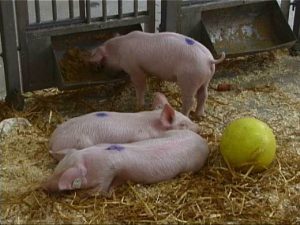In research, animal care committees advocate the implementation of the Three Rs principles- reduce, refine and replace. However, the unique conditions required for animals involved in xenotransplantation make these goals difficult to achieve.
Primary Welfare Concerns in Xenotransplantation:
Invasiveness of procedures
- Production of transgenic animals:
- Hormone injections to induce super-ovulation
- Embryos surgically harvested from breeding animals
- Males are vasectomized to induce pseudo-pregnancy in surrogate females
- Surgical embryo transfer to surrogate females
- offspring often delivered by caesarean section (major surgery)
- Frequent screenings involving tissue and blood samples to determine genetic inheritance and ensure animals are pathogen-free
- Animals involved in pre-human clinical trials (often nonhuman primates):
- Major surgery
- Pain and suffering if xenograft is rejected
- Animals used as donors:
- Major surgery
- Use of certain anaesthetic agents may be prohibited because they may be harmful to the human recipient
- Sequential organ procurement has been suggested for kidneys; animals would be subjected to multiple organ harvesting surgeries

Pig undergoing an invasive surgical procedure.
Animal Wastage
- Many animals used in the production of transgenic animals
- CRISPR has substantially reduced the number of animals used for this purpose, but there are concerns that this technology could lead to an increase in transgenic animal production in general
- A surplus of animals are kept for the propagation of useful germ-lines for future experiments
- Can be refined by cryopreservation of gametes
- Animal sacrifices:
- In breeding after blastocysts/embryos are harvested
- If the animal does not inherit the desired gene
- If the animal is exposed to a potential pathogen
Unintended Genetic Outcomes
- Off-target mutations (common with HR)
- Less frequent when CRISPR is used
- Unanticipated outcomes of intentional gene modification:
- Deletions and insertions of genes can result in behavioural and physiological changes in unexpected ways (may not be apparent to the researcher)
- Example: pigs modified to express CTLA4-Ig to improve immuno-tolerance became immunocompromised and resulted in premature death
Sterile Rearing Environment
- Animals to be used as donors must be certified pathogen-free
- Environments are restrictive
- Often raised in isolation, deprived of social interactions
- Natural foodstuffs, rooting and bedding materials are often prohibited (may be contaminated)
- Often weaned prematurely, causing distress to mother and piglet

Sterile environment for specific pathogen-free pigs.

Enriched environment for pigs in research. These conditions do not meet the criteria for pathogen-free pig rearing. (Krug & Cussler, 2001)